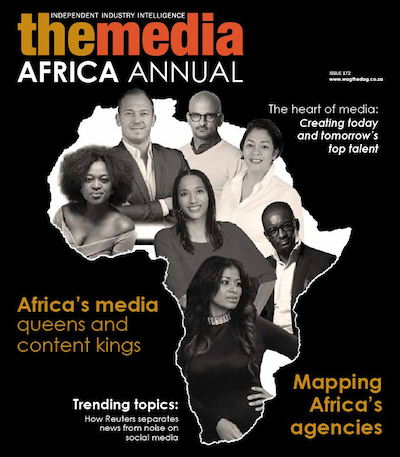Heading up Reuters’ Africa service is Simon Robinson, regional editor for Europe, Africa and the Middle East. He has hundreds of reporters, editors and correspondents reporting to him and is responsible for directing dozens of bureaus across the regions he controls.
The news agency was founded in 1851. Forced to flee his native Germany to escape arrest for his role in producing radical pamphlets, reporter, entrepreneur and innovator Paul Julius Reuter spotted a gap in the news distribution market.
At the time a post train was used to deliver details of stock prices and he realised that there was a profit to be made if he could deliver financial information to investors quicker.
So, in 1850, he set up a distribution service using carrier pigeons to deliver financial news and stock prices between Brussels and Aachen in Germany, giving customers of his service an edge over those who depended on the slower train service.
Always alive to new opportunities to improve his service, Reuter moved to London and launched the Reuters news agency in 1851. He rented an office near the Stock Exchange after he realised the opportunities that the construction of a telegraph line between Britain and Europe would open up.
Because of his journalism background he also understood the importance of being first with information and in 1863, he erected his own private telegraph link to Crookhaven, on the far south-west of Ireland. Then he arranged for ships from the United States to throw waterproof canisters containing the latest news into the sea.
These were then retrieved by waiting boats and rushed to shore, from where Reuter telegraphed the information to London, beating his news rivals who only got the information when the ships finally eventually arrived in Cork. He also exploited the newly-laid Dover to Calais underwater cable to send dispatches to and from continental Europe via telegraph.
Anyone working for a wire service – a term harking back to the days when the telegraph was used to transmit information – will tell you that it is a constant race to get “the beat”, counted in seconds and minutes, on rivals. Often clients subscribe to more than one news service and the race between rival agencies to push news first, so that it is their stories that are published or broadcast, is fierce and unrelenting.
From those humble beginnings 166 years ago, Reuters has grown into a news and financial news giant with over 2 500 staff reporters based in countries around the world. Its news is read by over a billion people each day, and it has 1 000 newspaper and 750 TV clients of its different services.
Deep African footprint
In sub-Saharan Africa its footprint is deep, with a head office in Johannesburg and more than 30 reporters covering the region. It also has sizeable offices in Nairobi, Lagos, Dakar, and Cairo, and offers several local language services, including a large Arab news service.
 Heading up the Africa service is Simon Robinson (left), Reuters’ regional editor for Europe, Africa and the Middle East. He has hundreds of reporters, editors and correspondents reporting to him and is responsible for directing dozens of bureaus across the regions he controls.
Heading up the Africa service is Simon Robinson (left), Reuters’ regional editor for Europe, Africa and the Middle East. He has hundreds of reporters, editors and correspondents reporting to him and is responsible for directing dozens of bureaus across the regions he controls.
“We operate in lots of places around the world and each presents different challenges,” Robinson, who was previously based in Johannesburg as a foreign correspondent, told me in a recent Skype interview.
What of criticisms often directed at the big agencies that they report from a Western perspective that often glosses over and oversimplifies complicated issues for a first world audience, I ask him.
“That is not true. In the bulk of our bureaus, especially the large ones, the people who work for us are locals. We are both global and local and besides international news, we also have local language services. There is some translation, but our local reporters are well sourced and they go deep and know the lay of the land. They are our secret weapon,” he says.
And just like Paul Reuter launched a news empire on innovation, speed and opportunities opened up by new technology, the 21st century Reuters is following in its founder’s footsteps.
Role of social media
Its latest offering is Reuters Connect, “a single digital home for more than five million pieces of news content that includes four million photographic images, over one million video films, more than a million written stories and a range of infographics.” Clients are allocated points according to their contract and are able to download content and pay using their points.
On the news front, social media has become an important tool in the agency’s news-gathering, reporting and marketing armoury.
In an age where anyone with a smartphone and an internet connection can be a reporter, and where civilians often find themselves in the frontline of breaking news, monitoring social media has become vital for journalists.
“We use social media for publicising our stories, for monitoring news, for crowd sourcing and identifying contacts,” says Robinson.
And once again Reuters is at the forefront of innovation with a propriety social media listening tool called Tracer, built by in-house techies. Using an algorithm that employs machine-learning, a form of artificial intelligence that gives a computer the ability to learn without being specifically programmed, Tracer monitors the deluge of over 500 million tweets posted each day to surface news from the noise.
Tools for newsdesks
A recent Reuters blog explains how Tracer works. “Today, Reuters journalists use Reuters News Tracer, our proprietary algorithm that employs over 700 signals to determine whether trending topics are newsworthy and truthful. The social media listening tool was taught by our journalists to ask key questions, consult historical data, and weigh relevance just like a human would – but within 40 milliseconds.”
Says Robinson, “Tracer is primarily used on the news desk as a tool that can quickly identify anomalies in Twitter patterns. If a lot of tweets start popping up around a national disaster or if there is a terror attack it alerts the news desk that something is happening. From then on all the rules of journalism of reporting and verification apply, but the early warning gives us a head start on the opposition.”
Reuters also monitors other social media platforms like Facebook, Instagram and LinkedIn for breaking news and story ideas, he says. “Social media is an essential part of our workflow, especially among the younger reporters coming through. We have moved beyond social media as an integral part of journalism… it is journalism.”
Journalists more experienced in using social media, often younger digital natives, are teaching older journalists these skills, while the older journalists help mentor newcomers in old school, traditional journalism skills.
Robinson says that today it is essential that journalists are able to report across platforms and be able to report and write stories, take photos, use social media as a reporting tool and shoot and edit video on a smartphone. They also need to be able to think about how best to tell a story visually, using graphics and video, or as a narrative – or as a combination of all or some of them.
Paul Reuter no doubt would be happy to see how the agency that bears his name continues to innovate in its journey from using carrier pigeons, mail trains and the telegraph to cutting edge high tech, to find and deliver news in an ever-changing news environment.
This story was first published in The Media’s Africa Annual. To read the magazine, click on the cover.
Raymond Joseph is a freelance journalist, journalism trainer and fake news hunter.














